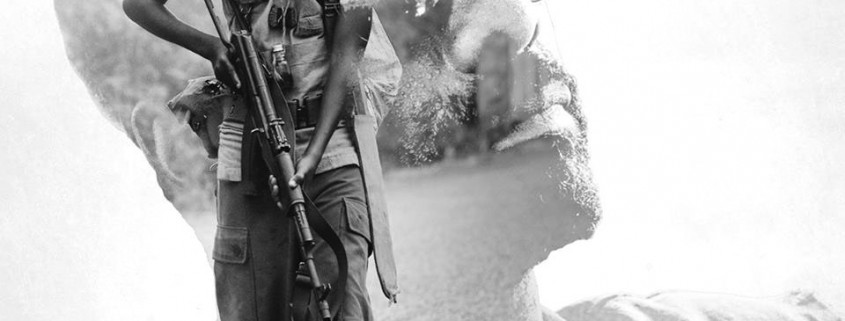Beasts of No Nation features unpretentious plotline
The much anticipated war drama, Beasts of No Nation, became available to public audiences on Friday, marking a new milestone for Netflix as the streaming media provider’s first feature film production.
Directed by Cary Fukunaga and based on a screenplay of the same name by Uzodinma Iweala, the film is set in an un-specified African nation that has become torn by war and rebel militias. The film’s protagonist, a boy named Agu (Abraham Attah), faces great adversity when rebels invade his village, causing his family to be separated in the chaos that ensues. The film perfectly captures the terror and distress in the many intense ambush sequences upon the innocents and the confusion that results from many different rival factions not being able to distinguish innocents from rebels.
This very case occurs when Agu’s brother and father are killed by the government soldiers believing they are rebels, yet Agu is able to escape into the forest. This leads into the central plot of the movie, where Agu is taken in by a rebel commander, played by Idris Elba, and hurled into the life of a child soldier. The relationship between the commander and Agu, as well as the other soldiers and child soldiers, is a multifaceted puzzle of conflict. While Elba’s character serves Agu and others as a father figure and appears to care for them, he can quickly transform into a ringleader of the boys he dehumanizes into murderous assets, and subjects them to poor conditions and rations. The control that Elba’s character has over the militia is what makes his performance particularly sharp, as he balances both a softer side and aggression, but always with an ulterior motive of self-interest, which makes the commander dangerous and unpredictable.
Attah, on the other hand, delivers a sincere performance that digs into the audience’s sympathy for his struggles and the disarray his life and nation have faced. As tribulations begin to surmount upon each other, his sense of self is further and further removed, and his description of himself as a “beast” in the eyes of others late in the film is especially harrowing considering his stable childhood. Though Agu’s dialogue comes in a large part in the form of voiceovers, the situations he faces are often what shows his greatest character development into the child soldier he once feared, which Fukunaga designs with precision.
That being said, the storyline at times does have a flow that lends itself to ambiguity. Certain scenes and sequences drag on during the 137-minute film, and the pace becomes convoluted in those moments. Nonetheless, the film is incredible in terms of a representation of the strife of war, the emotion involved and, particularly, set and costume design. Most of the child soldiers wear colorful, traditional hats, which are juxtaposed with the fierceness of their rifles and the what they do with them. Sequences with their vibrant costumes rushing out to ambush travelers appear especially striking and eerie, as the audience realizes these are just middle-school aged boys who have been indoctrinated by the commander to commit atrocities. Nevertheless, there are many moments like these which make Beasts striking as a whole, but none that distinguish themselves into specific, particularly memorable moments.
Then again, Fukunaga appears to have created a film that shies away from many cliches that may arise from war dramas set in Africa. Beasts of No Nation remains a film that doesn’t attempt to draw the audience in based on social issues and international issues, but truly on the art of the film and its stellar acting. Though the film may lose points with some for failing to capitalize on certain moments or for not adding to dialogue, it certainly does not stray away from reality, which should be commended.
The film ends with a time of reflection by Agu, and is somewhat reminiscent of stories told by other child soldiers removed from their wartime lives, such as Ishmael Beah’s A Long Way Gone. After leaving a war zone, it is often the most difficult time for soldiers to find themselves again and their expression, and Attah, despite his age, is at his most impressive in these scenes. Beasts of No Nation is remarkably honest, and Elba and Attah elicit standing ovations for their authenticity and mastery of portraying the life of rebel warriors, which is grueling and unfamiliar but shocking and riveting to the audience.

